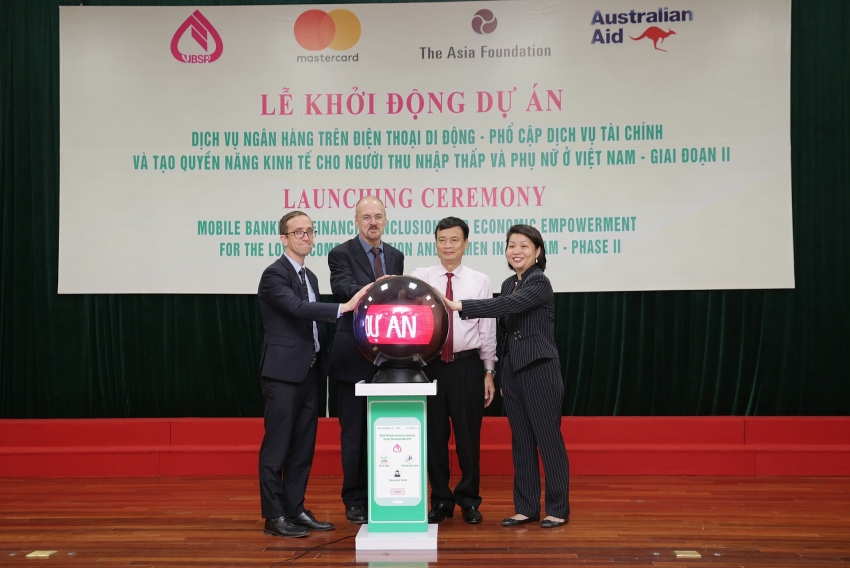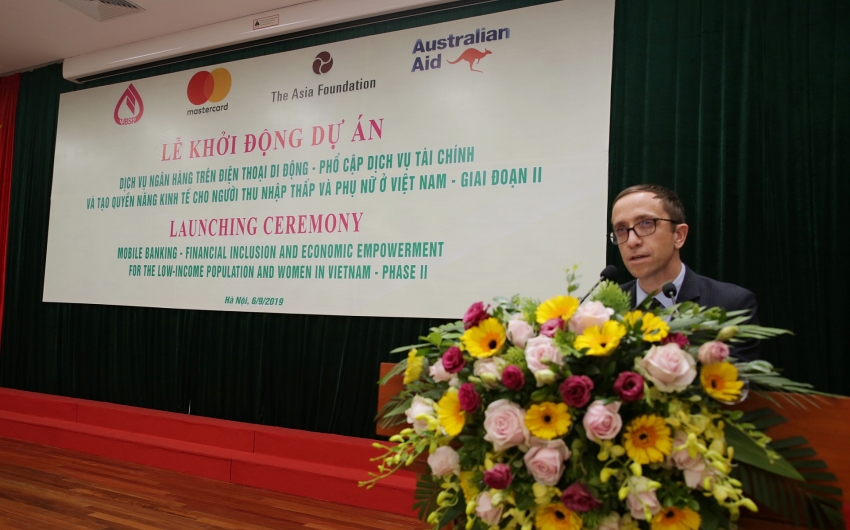VBSP launches Mobile Banking 2 project towards financial inclusion
 |
| The recent launching ceremony of Mobile Banking 2 project of VBSP |
The project is funded by the Australian Department of Foreign Affairs and Trade (DFAT) under the framework of a platform of business partnerships and aims at enhancing and improving access to financial services for poor, low-income households, especially women-run micro-enterprises.
Mobile Banking 2 will continue co-operation between the bank (VBSP), Mastercard, and The Asia Foundation (TAF) for 2019-2022 in 10 provinces and municipalities across Vietnam, such as Ninh Binh, Hoa Binh, Lao Cai, Nghe An, Binh Dinh, Dak Lak, Ho Chi Minh City, and Can Tho.
As a special and the biggest financial institution providing micro-financial services in Vietnam, over the past 17 years, the policy credit activities of VBSP have made significant contributions to ensuring effective implementation of policies, mechanisms, objectives, and tasks of the state under the National Target Programme for Sustainable Poverty Reduction and New Rural Development.
The programme is focused on human resources development and social security to prevent and reduce the negative impacts of informal credit on poor households and other policy beneficiaries, contributing to financial inclusion in Vietnam.
With a wide network of 11,000 communal transaction points under 63 branches all over the country, VBSP’s strength lies in its expansive transaction network covering all cities and provinces, down to village and commune-level providing services to every household.
By August 15, 2019, the total funds for policy credit programme touched VND198.968 trillion ($8.65 billion) with more than 6.6 million customers securing outstanding loans.
 |
As digital banking is increasingly taking shape in the era of the Fourth Industrial Revolution (Industry 4.0), the Vietnamese government has been stimulating IT applications towards financial inclusion in Vietnam as well as to gradually replace cash transactions.
Electronic transactions, such as mobile banking, have been deployed by banks all over Vietnam. However, in reality, the use of mobile technology in financial transactions is still limited, especially in rural and remote areas where cash transactions are still the primary method of payment.
To stay aligned with Vietnam’s Banking Strategy to 2025, VBSP has been developing the Plan for IT Development to 2025 within VBSP's system to enhance IT application in technical operations, especially payment services for poor households and other policy beneficiaries.
| The programme is focused on human resource development and social security to prevent and reduce the negative impacts of informal credit on poor households and other policy beneficiaries, contributing to financial inclusion in Vietnam. |
To boost its capacity for digital payment, since the beginning of 2017, VBSP has been collaborating with TAF and Mastercard to implement the Project “Mobile banking – Financial inclusion and economic empowerment for low-income people and women in Vietnam” – Phase 1 (Mobile Banking 1).
The project aimed at enhancing VBSP’s capacity of providing diversified and convenient digital payment services to its customers, including poor people and students in difficult circumstances, the disabled, ethnic minority people, and overseas workers, among others, across the country, especially those in rural, remote, and mountainous areas.
Mobile Banking 1 (2017-2018) posted positive results through enhanced capacity and awareness in terms of orientation, development, and implementation of the Plan for Developing Digital IT Platform to provide digital financial services to customers in the long run.
After Phase 1, VBSP has been successful in piloting and expanding regular SMS services for customers in 10 stakeholder provinces.
By the end of 2018, VBSP had sent SMS on a regular basis to 5.1 million customers across 63 cities and provinces have registered their mobile phone numbers with the bank.
The successful implementation of regular SMS services for customers has significantly enhanced the transparency and efficiency of operations, providing timely information to customers.
Based on the results of Mobile Banking 1, VBSP will continue collaborating with TAF and Mastercard to implement Mobile Banking 2 in 2019-2022.
Phase 2 will focus on supporting VBSP to develop the digital financial platform for the bank with the development of technology solutions for mobile banking services. It is expected that towards the end of the project, VBSP will be able to start providing mobile banking services to borrowing and savings groups and piloting payment services for customers to help them access financial inclusion services and improve service quality and achieve higher cost-effectiveness for both the customers and the bank.
Another important point is that Mobile Banking 2 will continue to implement the results of gender-based assessment among the bank’s customers in terms of access to technology and digital banking services so that the bank can mainstream gender issues in the planning and implementation of their programmes.
Mobile Banking 2 will continue to support VBSP in gender mainstreaming of banking activities for the economic empowerment of women.
Among the more than 6.6 million customers of VBSP who are poor households and other policy beneficiaries, women account for 60 per cent and up to 90 per cent of female customers participate in production and business in both agricultural and non-farming activities.
In this period, the project will prioritise female customers who are facing difficulties in accessing technology and financial services to contribute to ensuring social security and inclusion of poor households and other policy beneficiaries.
What the stars mean:
★ Poor ★ ★ Promising ★★★ Good ★★★★ Very good ★★★★★ Exceptional
 Tag:
Tag:
Related Contents
Latest News
More News
- Spring Fair 2026 boosts domestic demand (March 02, 2026 | 16:30)
- Law on Investment takes effect (March 02, 2026 | 16:21)
- Ho Chi Minh City attracts nearly $980 million in FDI in early 2026 (March 02, 2026 | 10:57)
- Businesses bouncing back after turbulent year (February 27, 2026 | 16:42)
- VinaCapital launches Vietnam's first two strategic-beta ETFs (February 26, 2026 | 09:00)
- PM sets five key tasks to accelerate sci-tech development (February 26, 2026 | 08:00)
- PM outlines new tasks for healthcare sector (February 25, 2026 | 16:00)
- Citi report finds global trade transformed by tariffs and AI (February 25, 2026 | 10:49)
- Vietnam sets ambitious dairy growth targets (February 24, 2026 | 18:00)
- Vietnam, New Zealand seek level-up in ties (February 19, 2026 | 18:06)




























 Mobile Version
Mobile Version